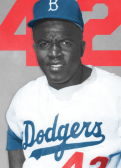'Pioneers in Pinstripes': Phils honor trailblazers on Jackie Robinson Day
PHILADELPHIA -- Nearly every day, Phillies managing partner John Middleton walks through a lobby at Citizens Bank Park.
This lobby features photographs and the history of the Philadelphia Stars.
Middleton often stops to look and read. Occasionally, he has gone home, logged onto his computer and searched for more stories about the Negro League team.
But Middleton's thoughts often turn to the pioneers who broke the color barrier for the Phillies. Where was their story? Where were their photographs?
The Phillies soon assembled a committee to learn and eventually share their stories. Those efforts became the "Pioneers in Pinstripes" exhibit at Citizens Bank Park's Hall of Fame Club, which the Phils unveiled on Jackie Robinson Day.
"There were a lot of people who deserved credit for moving us forward and getting us to where we are today," Middleton said.
The Phillies were the last National League team to integrate with infielder John Kennedy in April 1957. But numerous players of color were signed and played in the Minor Leagues before him.
This exhibit honors those players.
"We were, frankly, in my opinion, negligent in not talking about these people and promoting these people," Middleton said. "We're preserving their memory and their actions and deeds for history. For our history, for Philadelphia's history."
Some of those players Phillies fans know, like first baseman Dick Allen and infielder Ruben Amaro Sr.; others they don't.
Some players they are learning about for the first time include Ted Washington, the Camden, N.J., baseball and football star who became the first Black player to be signed by the Phillies in 1952. Chuck Randall, Nathan Dickerson and Eddie Logan were some of the first Black players to play in the Phillies' farm system, and Richard and Robert Haines were twin outfielders who signed with the Phillies in 1958. Hank Mason became the Phillies' first Black pitcher in 1958.
"There wasn't a lot of information about them that was easily available," said Phillies director of amateur scouting administration Rob Holiday, who spearheaded the committee.
Families of those players attended Monday's ceremony. A few spoke. Kennedy's daughter, Tazena Kennedy, read a poem about her father that brought many in the audience to tears.
"As the evening days pass, and the lights fade to dark, John Irvin Kennedy's name is etched in the halls of Citizens Bank Park," she said. "It is with gladness and good cheer that my Mr. Baseball, my dad, is no longer a forgotten pioneer. Dad, my efforts to keep your name alive have not gone in vain."
Ruben Amaro Jr. welled up as he spoke about his father, Ruben Amaro Sr., who played for the Phillies from 1960-65 and spent decades working with the Phillies in countless roles.
"His life was basically lived to be a Phillie," Amaro Jr. said. "I remember him saying to me many, many times … He said he wanted to die with a Phillies 'P' on his chest and I think he sure did. … I want to thank all the people and the families here because without them, my dad never becomes a Philadelphia Phillie, and we don't get a chance to live this beautiful life."
Terry Washington is the son of Ted Washington.
"I wish my father were here to see this," Washington said. "I'm honored to stand in his place. I learned more about my father in the last few years [through the Phillies' committee] than I did in 63 years."
Willa Allen is Dick Allen's widow. Allen was the Phillies' first Black superstar. The Phillies retired his No. 15 in 2020. He should be in the National Baseball Hall of Fame one day.
"This tribute not only celebrates talent, but it acknowledges their important role in advancing diversity and inclusion in baseball," Allen said. "Seeing Dick's name among these players … gives me immense pride. We are deeply thankful for this recognition of his legacy and the contribution of these fellow athletes. The 'Pioneers in Pinstripes' serves as a reminder of the barrier they overcame and the lasting impact they made in the game we all love."

